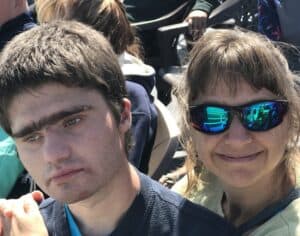(Listen to this content instead on our podcast)
When kids with disabilities grow up
It’s always hard to believe when our children grow up and become “official” adults. And it happens in differnt ways. Some get their driver’s license at 16 or 17. They can join the military at 17. At 18 they are legal adults! Now they can vote and we can no longer sign their permission slips, see their grades or approve medical treatments without their permission. (Whaaat?)
At 21 our children can legally drink, and at 22 many are getting jobs or finishing college. However their paths go, they are thrust out into the world and expected to fend for themselves with less and less support from us, their parents. And we are left to wring our hands and pray that they’ll be ok.
My child is an adult. How can that be??
My son Tyler is a sweet boy who loves trains, snuggling and listening to The Wiggles. While his dad and brothers tower over me, I still have to bend down to hug him. I can even give him a piggy-back if I need to–and sometimes I need to! He insists, in his own way, that I tuck him in at night.
So it’s hard to believe that at 22, he is an adult! I do get glimpses now and then that remind me he’s not a little kid. He went through the teenage get-away-from-me phase, just like his brothers. Tyler doesn’t talk, but when he pushes me away I can hear the subtitle: “Come on, Mom, I’m watching my videos, leave me alone!”
What happens at age 22?
For kids with disabilities or special needs, the path to adulthood is often different, and often harder. At age 22 there is a big cut-off, which can feel like a cliff: they age out of special education and switch to adult services. They’re adults, but to us they may still seem fragile like children.
My son reached that cut-off this year, and I’m still wrapping my head around it. Tyler has a significant intellectual disability and needs help with almost every daily task. This summer, in a sudden wrenching of his life, he had to leave the residential school he’d been in for 4 years and move to an adult group home.
On the surface, it doesn’t seem like such a big change. He’s still in a house with 8 residents and lots of support staff. He still takes a van every day to a place where he does activities geared toward his interests and goals. But now, instead of school, it’s a Day Habilitation (Day Hab) Program. Here, there are many things that have thrown our family for a loop because adult programs do things differently than the schools.
Life after school: What’s different for adults with significant disabilities (and their families)?
Different peers:
The biggest “whoa!” moment was when we toured the group home. (Only once, at the last moment, and very limited, due to COVID.) The residents range in age from 22 (Tyler) to 72! Most are much older than him, and somehow that really drove it home that this was not school anymore. And I worry: will he relate to these new peers in the same way? Will there be enough youthful activity to keep him engaged?
Less parent involvement:
Maybe it’s because of the older residents, but the house and program managers are not as used to keeping us parents in the loop. Sometimes I have to remind people to include us in emails and invite us to doctor’s appointments. Although the day program has therapists on site (speech therapists, occupational therapists, etc.) I haven’t been able to talk to them directly.
And we’re not encouraged to just go to his house and hang out with him, showing that we are still part of his life in this new place. It doesn’t feel right, but then I guess all parents have to get used to being less involved with our adult children’s day-to-day lives.
More hands-off approach:
Schools use IEPs and learning goals. They push students to engage in activities and learn new independent skills. I knew Tyler’s teachers and therapists would make him brush his teeth, even if they held the brush with him, hand-over-hand. They’d strongly encourage him to go on community outings.
Now, his group home caretakers say “If he doesn’t want to do it, we won’t push him. He’s an adult and can make his own decisions.” I get that, but it can lead to slower (or no) progress on learning ADL’s (activities of daily living), and less community engagement. Again, it makes me worry. What parent wants their child to not be pushed and engaged as much as possible?
Taking care of my child and myself
Even in writing this, I find myself talking about my son’s needs first. How to advocate? How to make sure his caretakers do x, y and z to support his needs? How can we make sure he’s not lonely? But what I meant to address was how we parents, have to get used to our child being out in the world…out from under our umbrella and without the structure of school support and a good IEP.
I know we have to let go and let our kids have some independence. Even if it means their life, at first, may not be as full and busy as it was as students. But we’re still their parents and we will always do what we can to keep them happy and moving forward as much as they’re able. So how do we take care of our own needs along with our adult child’s?
Here’s what I’ve come up with so far:
-
Stay connected to my friends and family. Talking to them helps me process this change.
-
Advocate for services he needs, and also how people treat him. If I know he’s being taken care of with kindness and understanding, and getting the attention he needs, we’ll both be better off.
-
Remember he needs to feel independent. Sometimes I have to resist helping him with things I know he can do. I have to make myself say “You can get your own iPad and fidget. They’re on the couch in the other room.”
-
Give him as much love as I can. This one’s easy! We FaceTime with him during the week, tell him how much we love him, and bring him home on weekends. And now he mostly lets me snuggle with him…which is good for both of us! ❤️
To learn more about how to support your new young adult, see our Transition to Adulthood resources and Life after the IEP blog.




